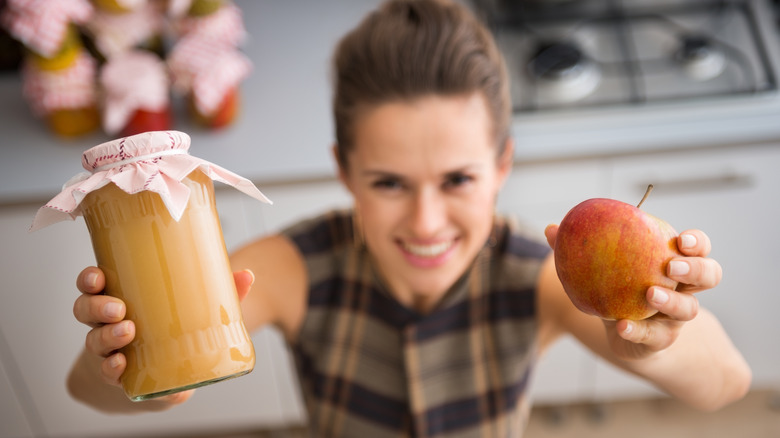
Applesauce was likely one of the first foods you tasted as a baby, and perhaps your parents chose it as a side dish for your kid’s meals at restaurants. While it might not replace candy, the natural sweetness of applesauce can help satisfy your sweet cravings.
Though often considered a dish for children, applesauce is actually quite healthy. A cup of unsweetened applesauce contains 102 calories and nearly 3 grams of fiber. The 23 grams of sugar come from the natural sugars in apples. If you choose a brand with added ascorbic acid, you’ll receive 52 milligrams of vitamin C; without it, you’ll get 2.4 milligrams.
Beyond being a side dish, unsweetened applesauce can aid in recovery from digestive issues like diarrhea (per Healthline). It can also be used as a substitute for butter, oil, eggs, or sugar in baking recipes to make them healthier (per Craftsy). Adding applesauce to your daily diet could also boost your heart health.
Applesauce has the heart benefits of apples

Since applesauce is derived from apples, it offers similar health benefits. According to a 2015 article in Nutrients, apples are rich in insoluble fibers like cellulose and hemicellulose, and soluble fibers such as pectin. Pectin enhances digestion and promotes healthy gut bacteria. Polyphenols, primarily found in apple skins, can reduce inflammation linked to cardiovascular disease. Together, apple pectin and polyphenols can lower cholesterol and chronic inflammation. Apples also contain flavonoids like quercetin and epicatechin, which improve vascular function and reduce blood pressure.
Store-bought applesauce often contains apples, water, and ascorbic acid (vitamin C) as a preservative. This added vitamin C supports healing, collagen production for healthy skin, fights free radicals, and aids iron absorption (per WebMD). According to Mount Sinai, vitamin C might slow the progression of artery hardening and reduce LDL cholesterol damage. Low vitamin C levels have been associated with heart attacks, strokes, and artery diseases.
Making heart-healthy applesauce

Many of the nutrients in apples are found in the skin, but some store-bought brands exclude it. Check the ingredients of your store-bought applesauce, as some varieties contain added sugar or syrups that reduce its health benefits (per WebMD).
You can also make your own applesauce at home, though it won’t contain added vitamin C. Nevertheless, you’ll still benefit from the naturally occurring vitamin C in apples.
To make applesauce at home, you’ll need water and apples, with the option to add apple cider, lemon juice, or spices for flavor. Start by removing the apple cores and slicing them into one-inch cubes. Place the apples in a pot and cover with water. Bring to a boil and simmer for up to 30 minutes or until the apples are soft. Use a potato masher for a sauce texture, or a blender or food processor for smoother applesauce (per Food.com).
Southern Living suggests McIntosh and Golden Delicious apples for applesauce. For a sweeter taste, try Fuji, Gala, or Honeycrisp apples. If you prefer tartness, choose Granny Smith, Cortland, or Pink Lady apples.




